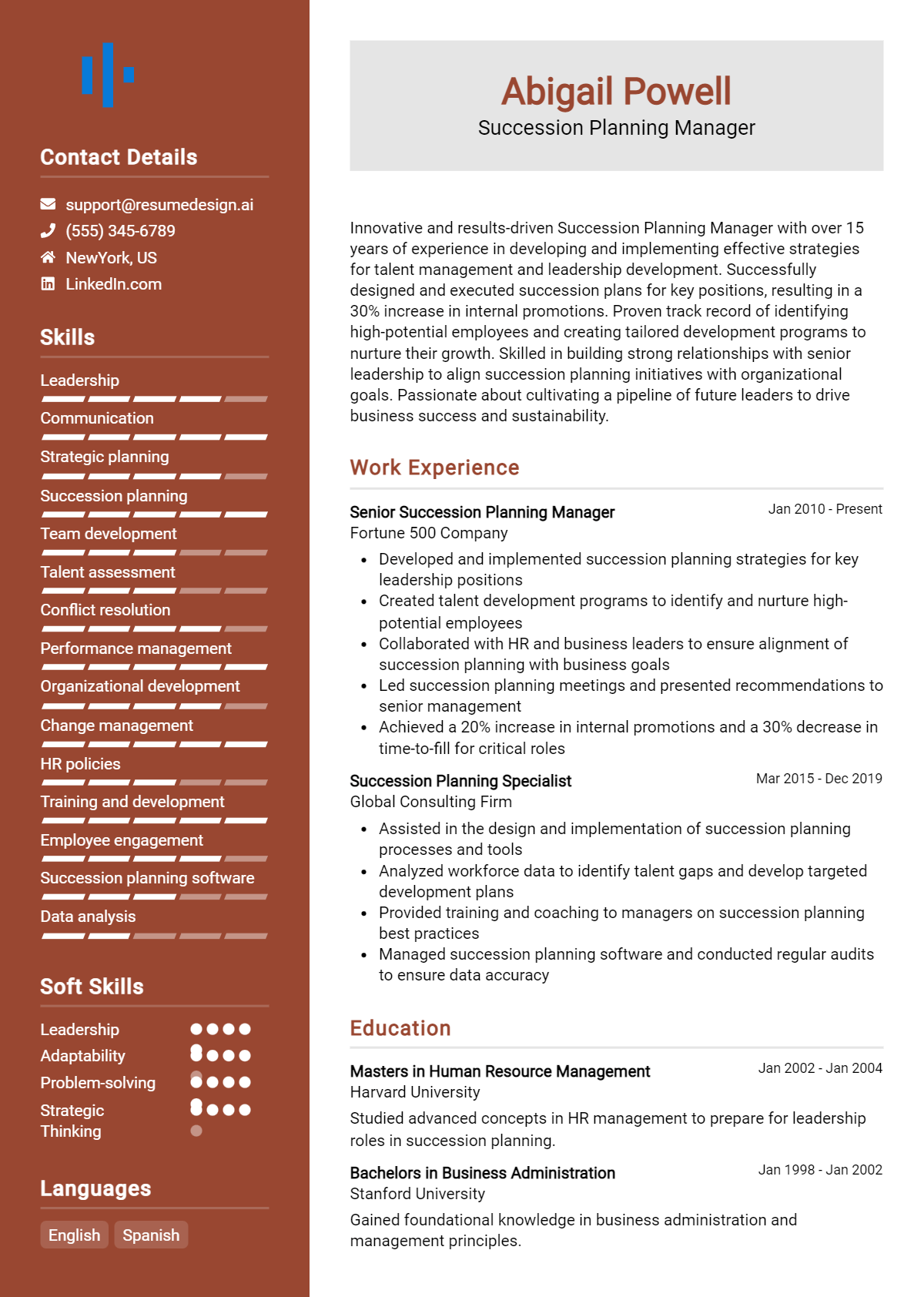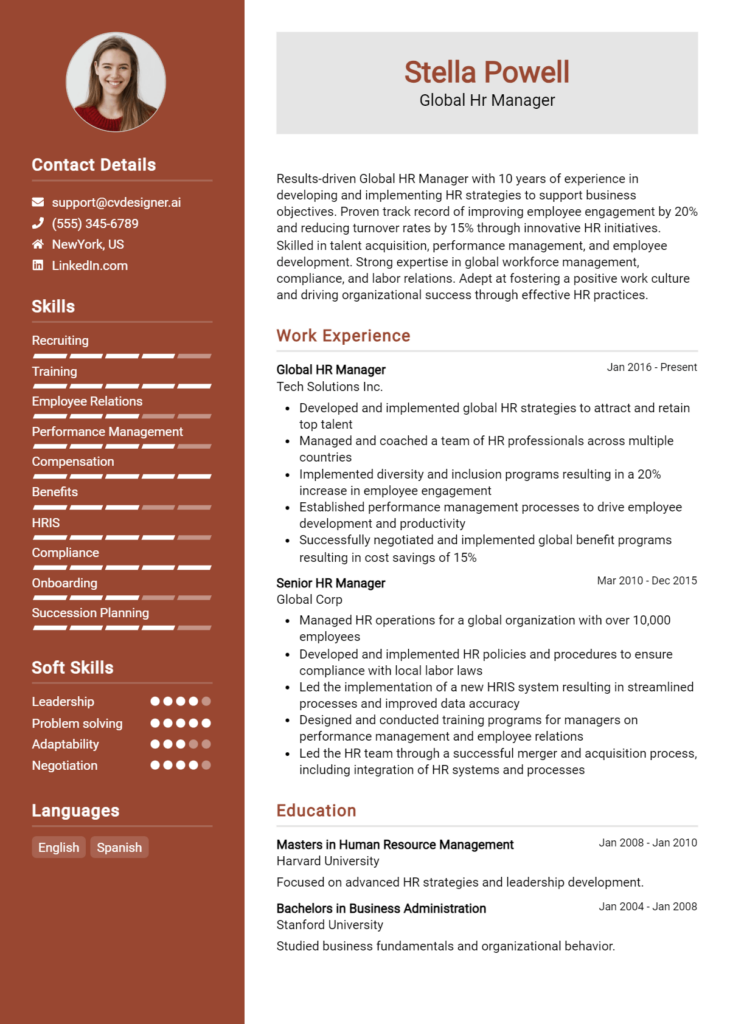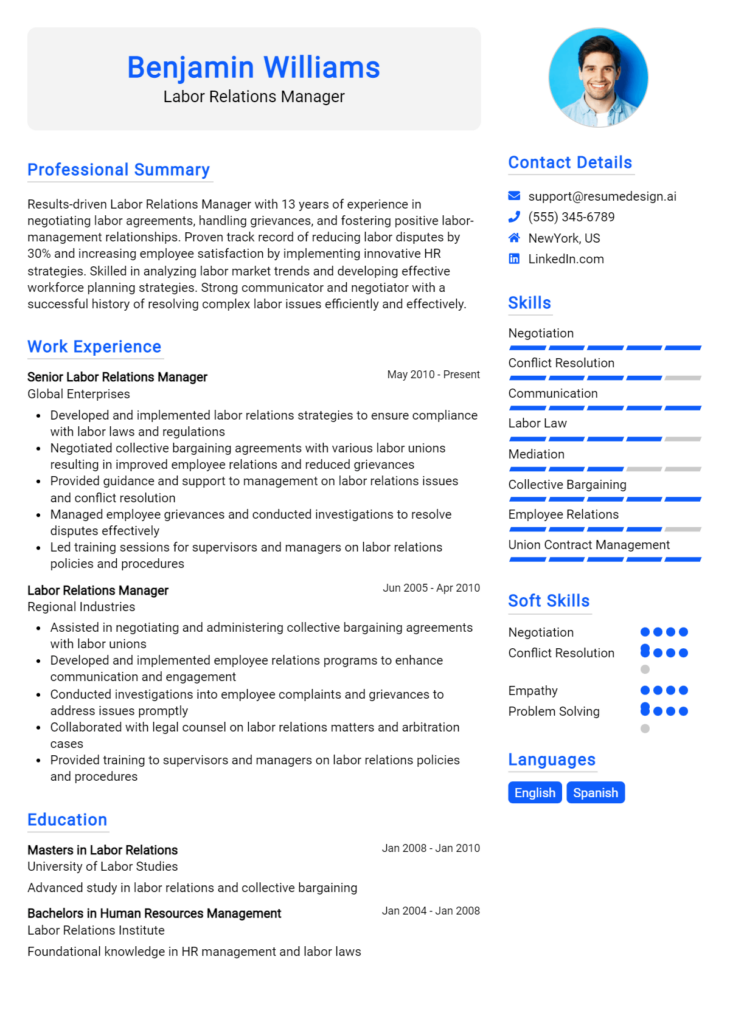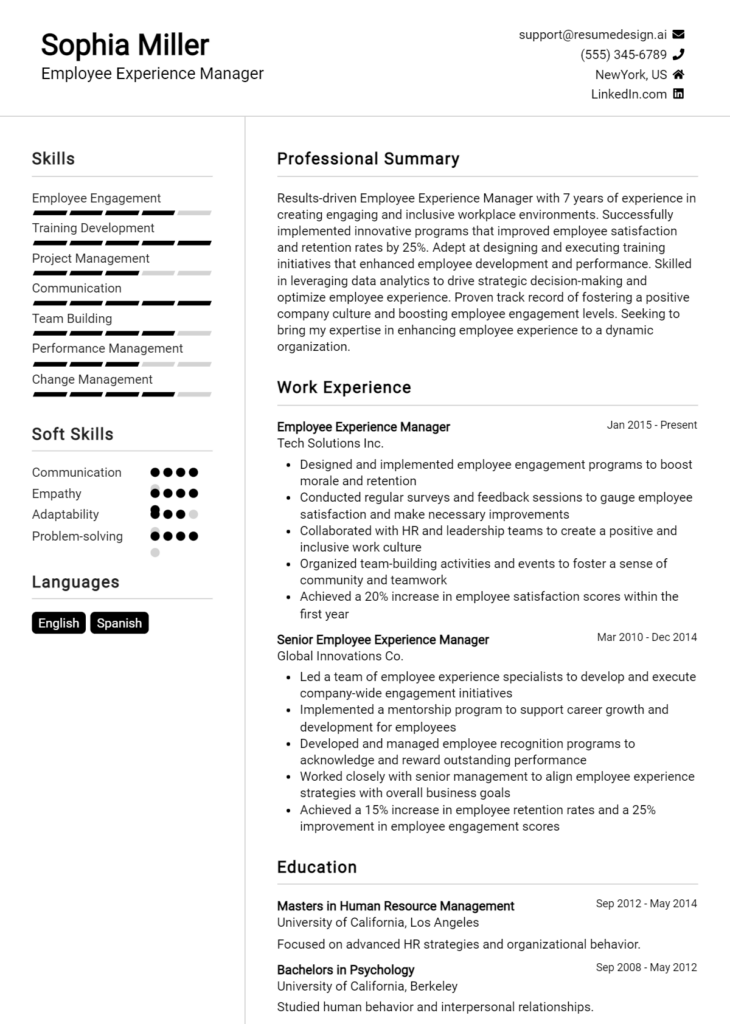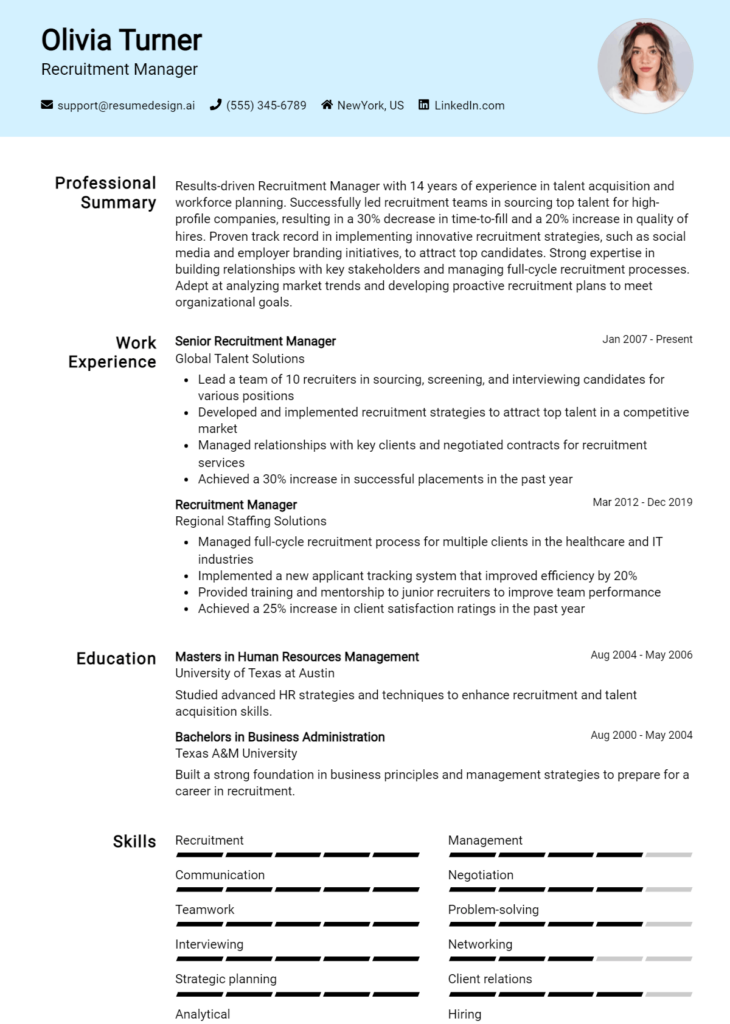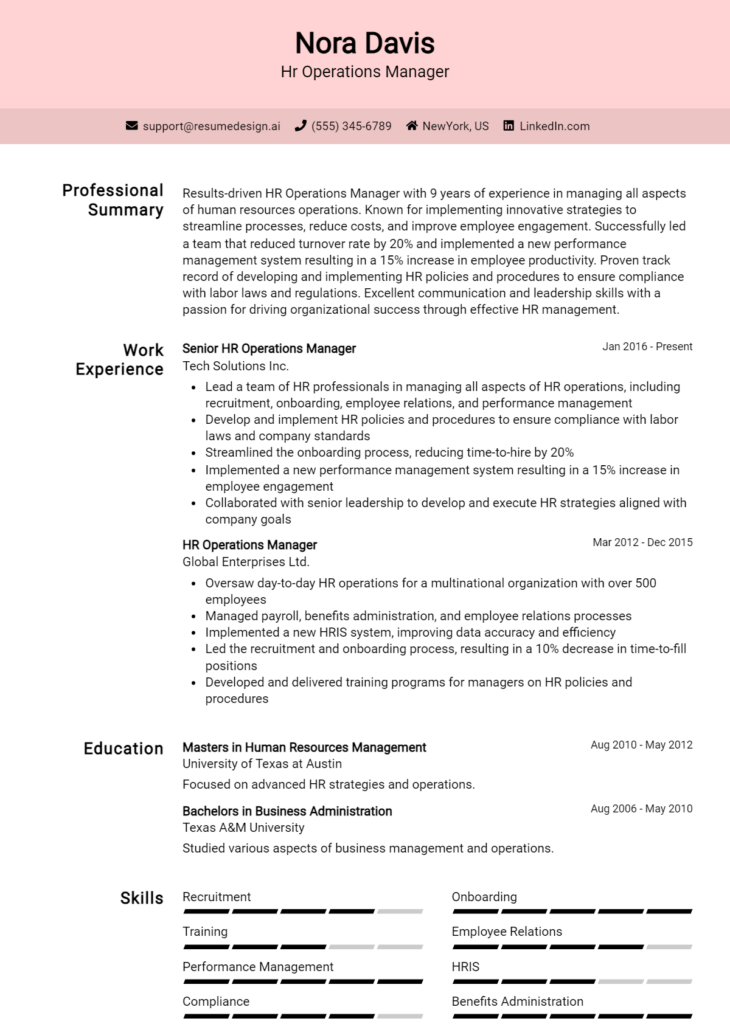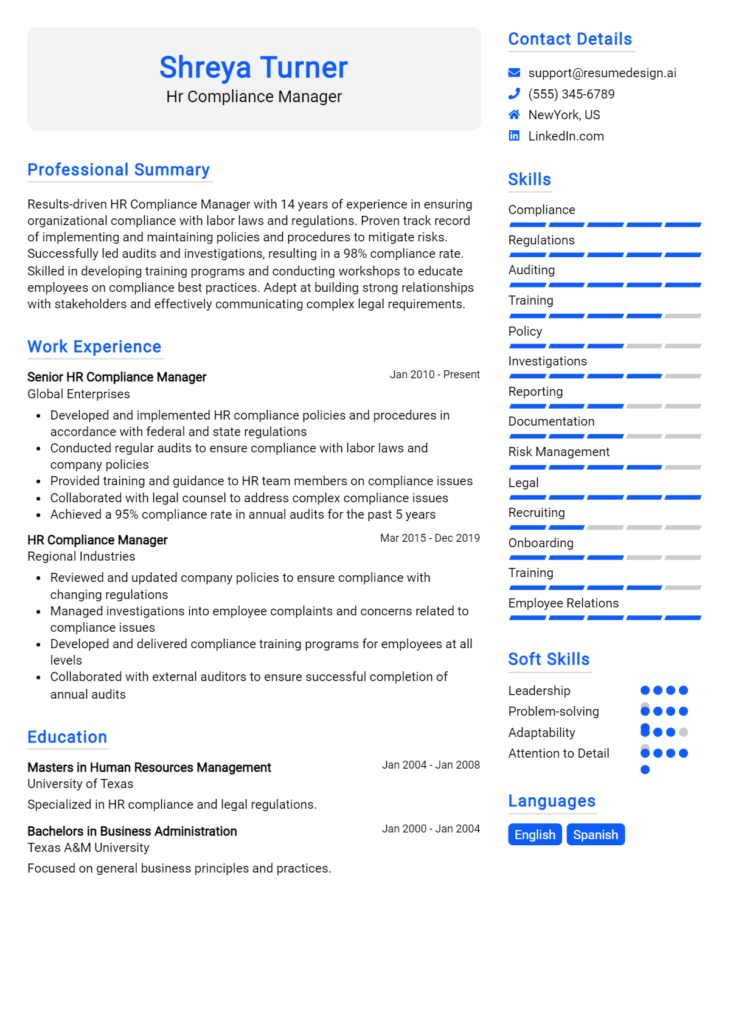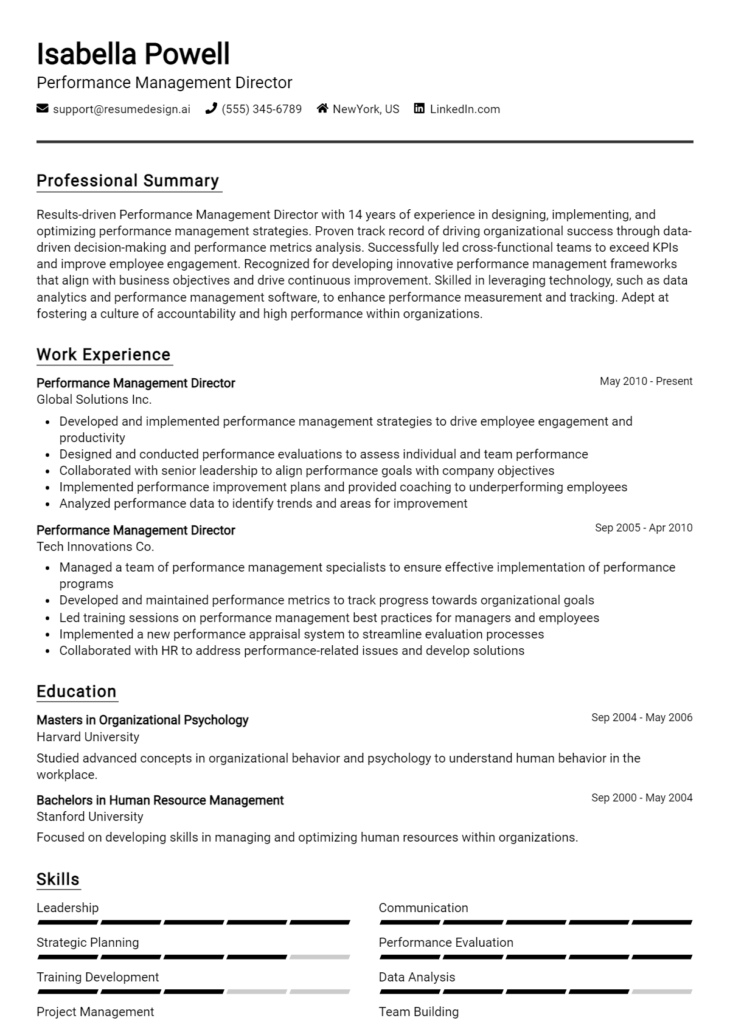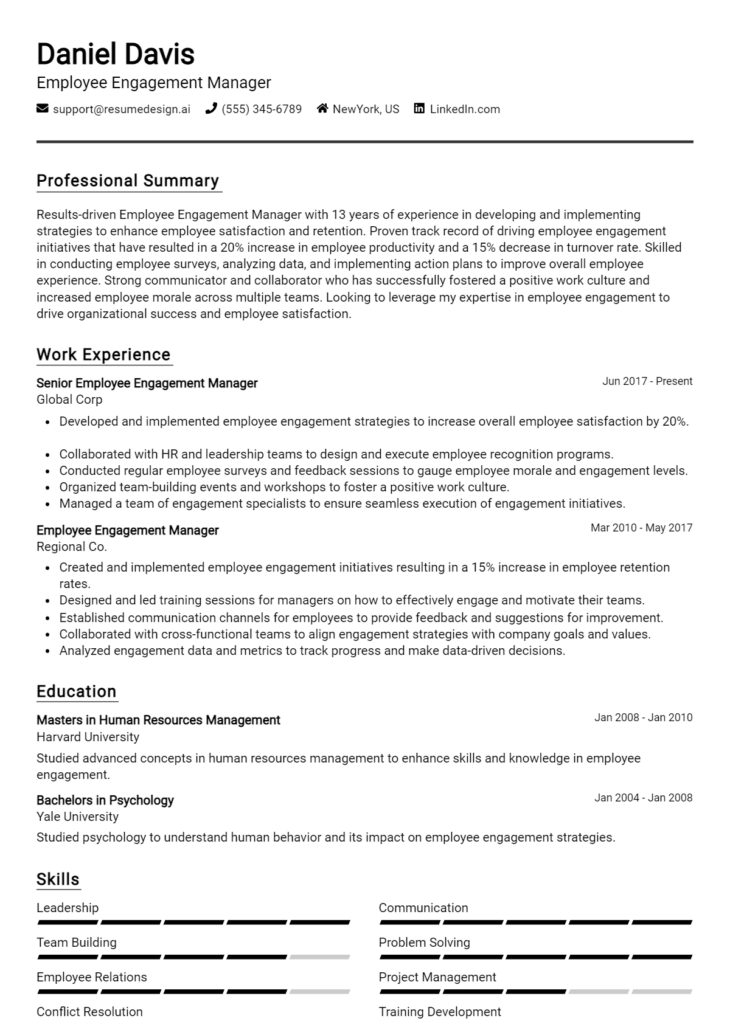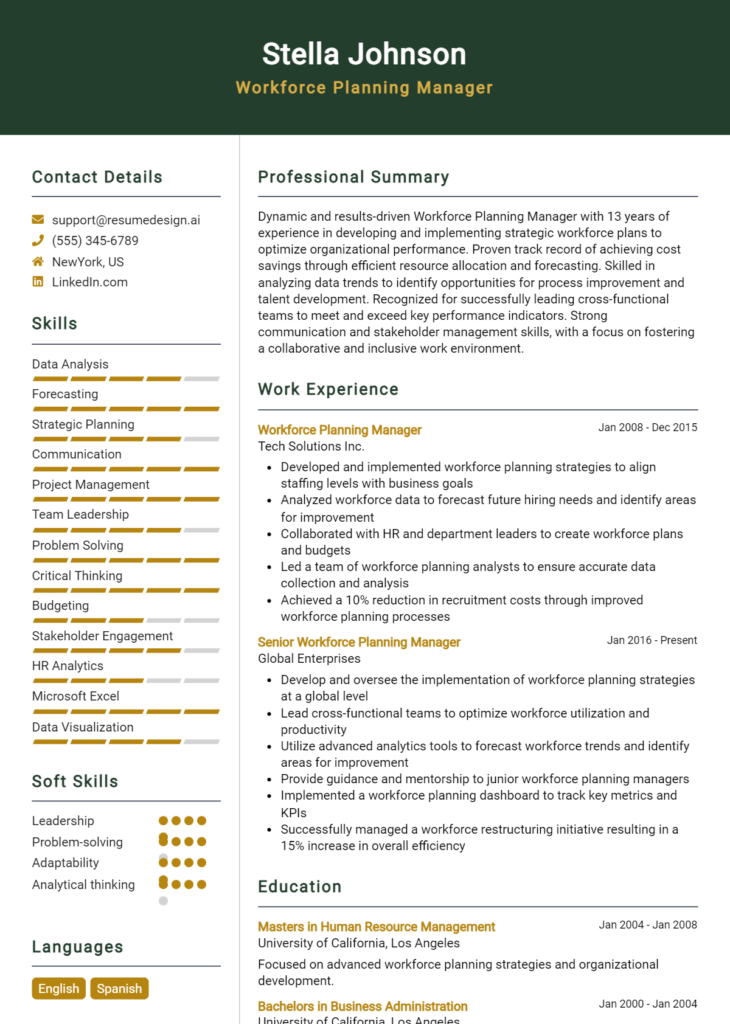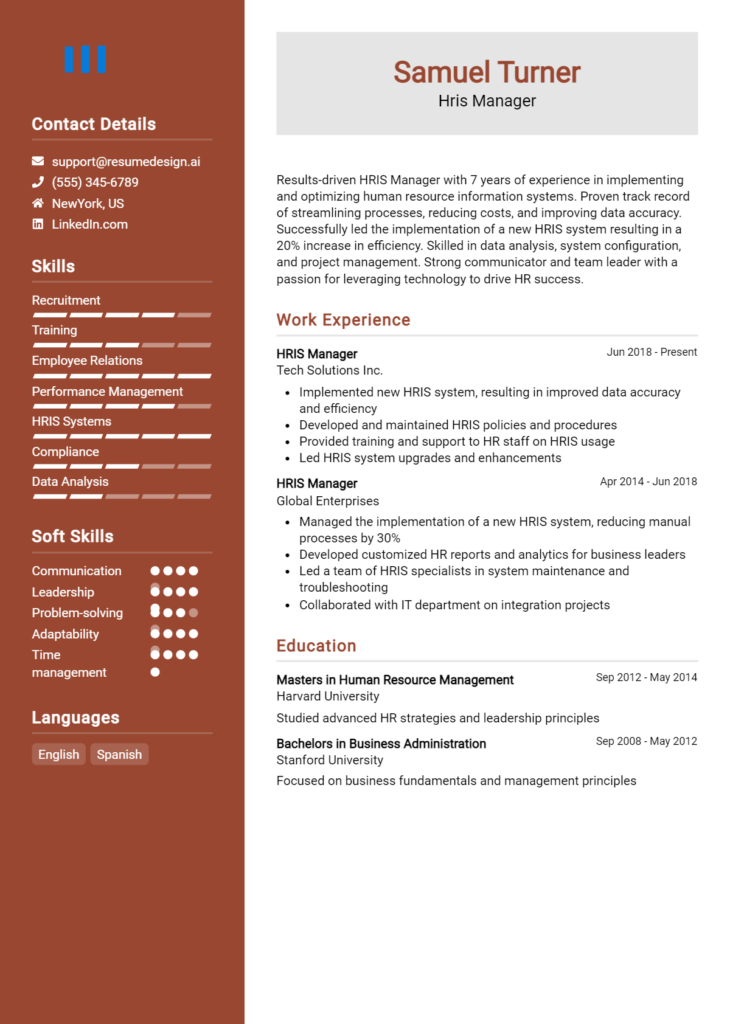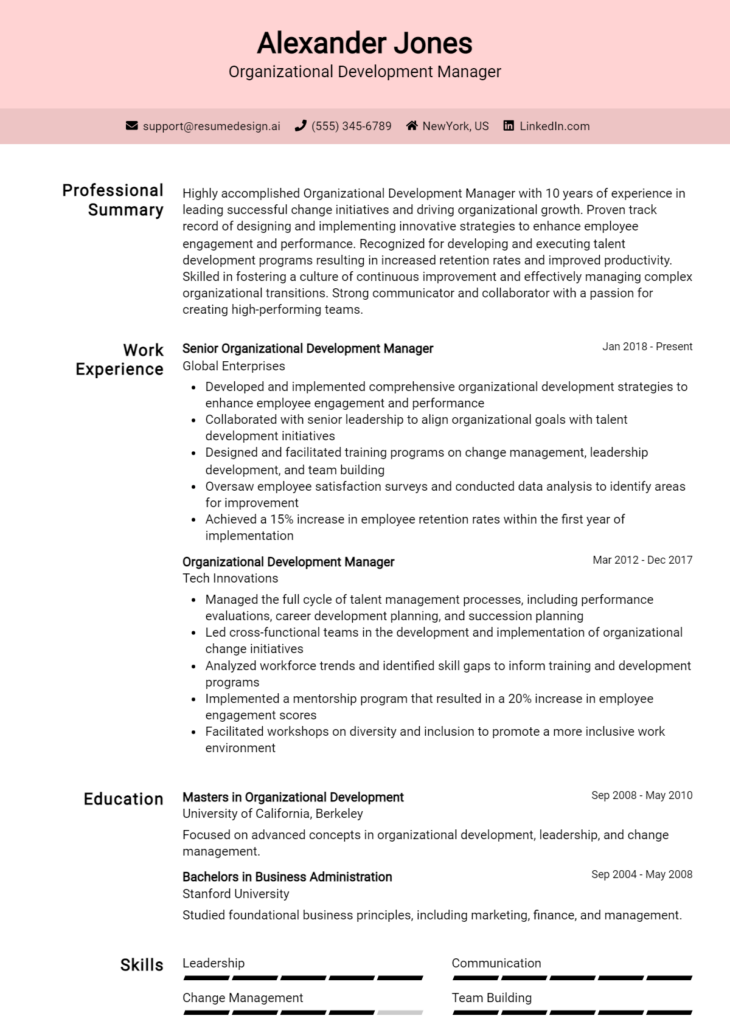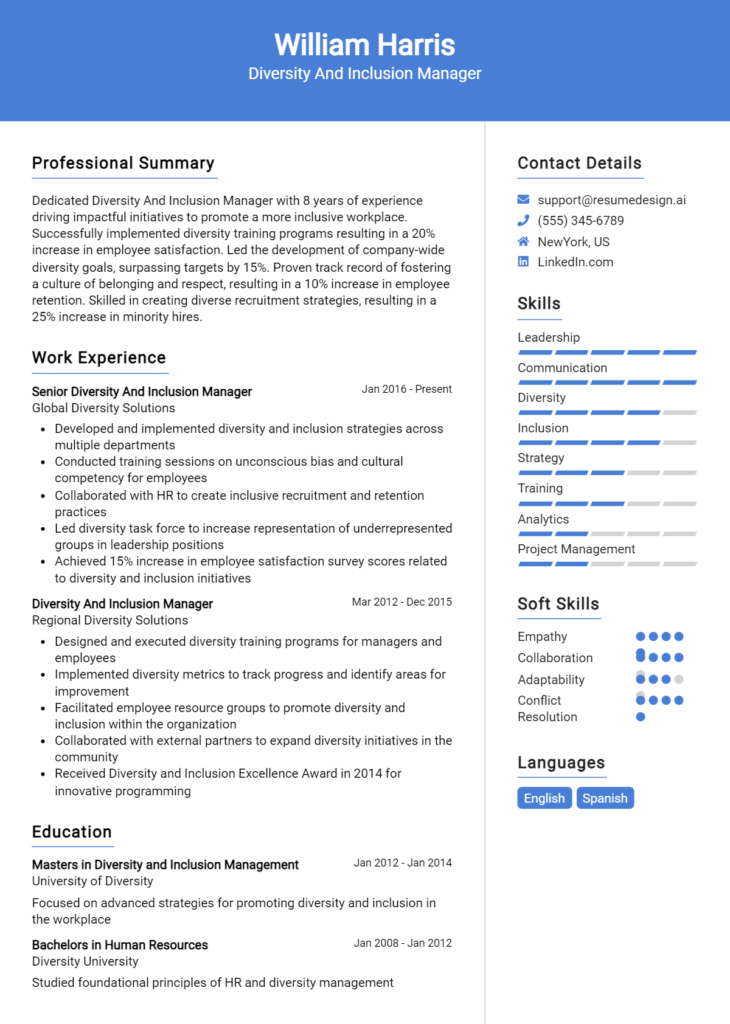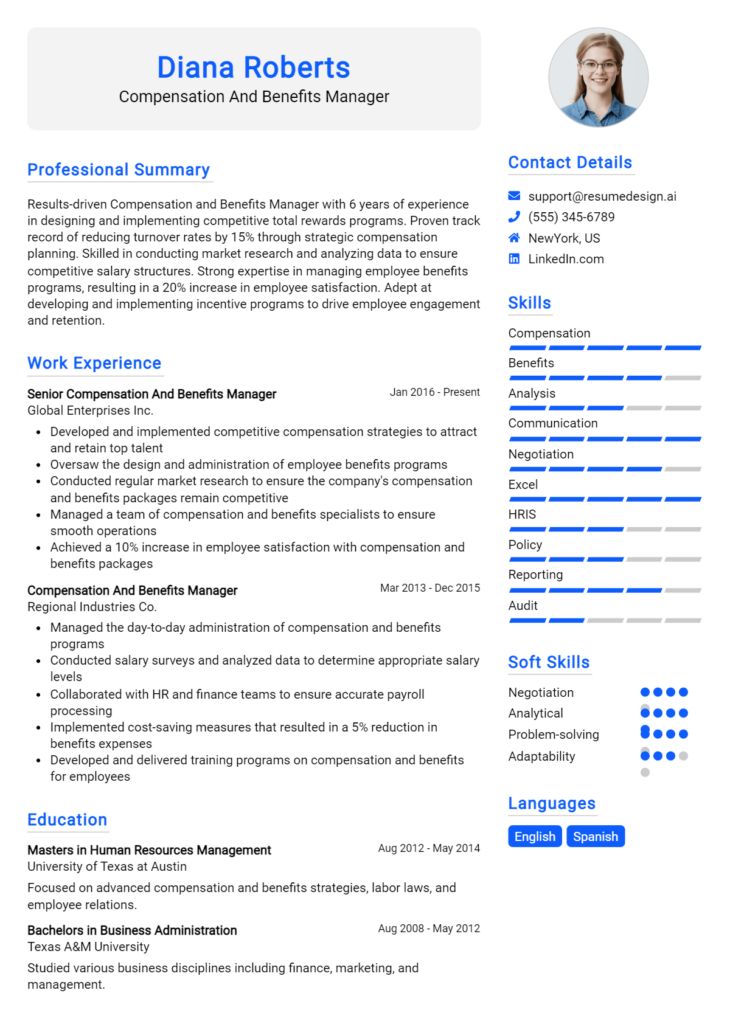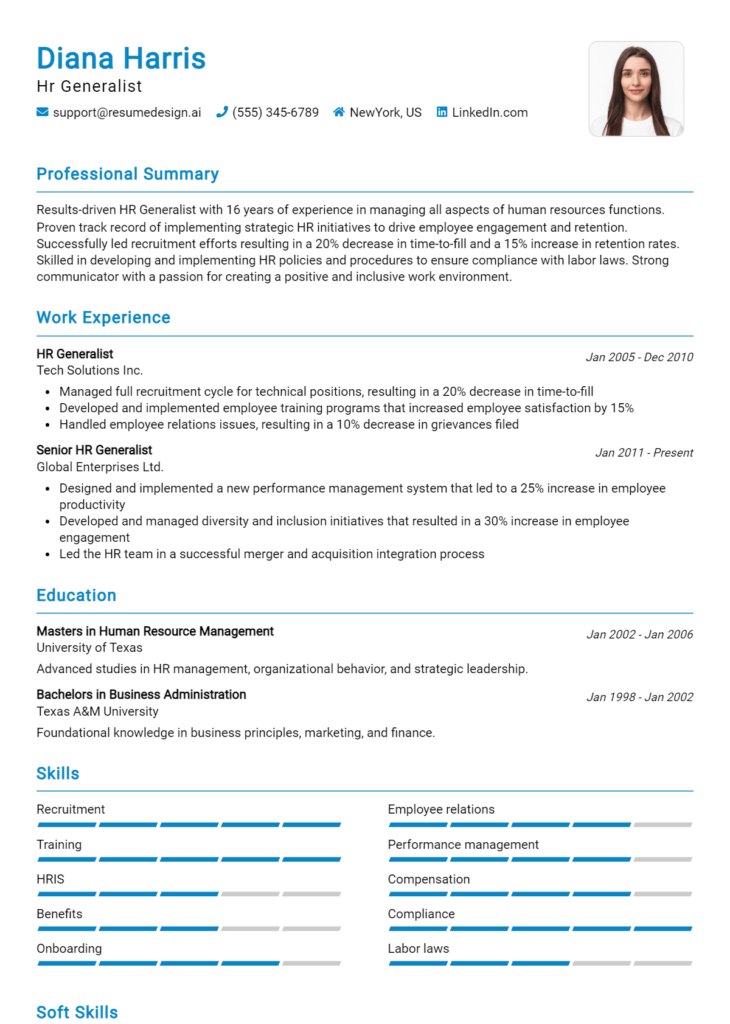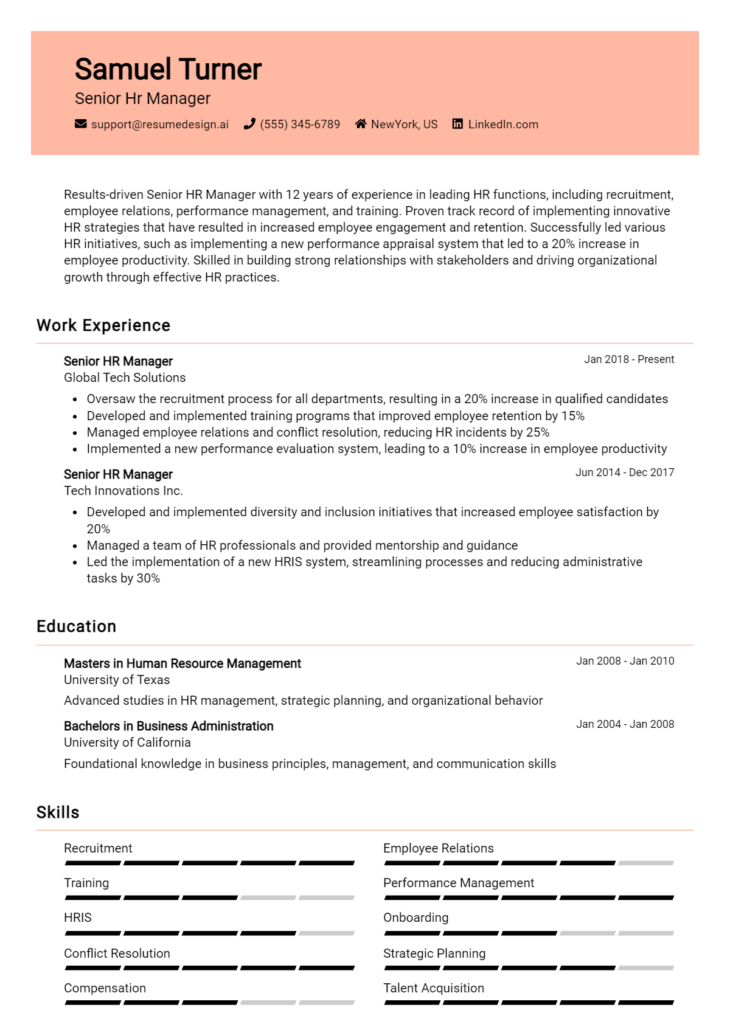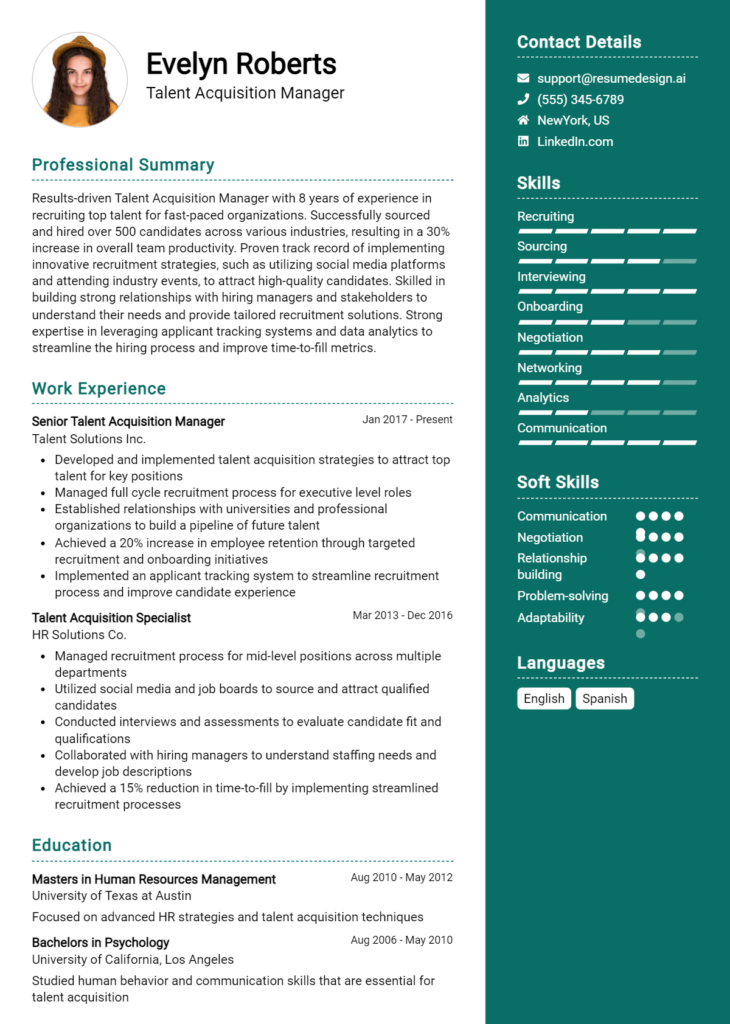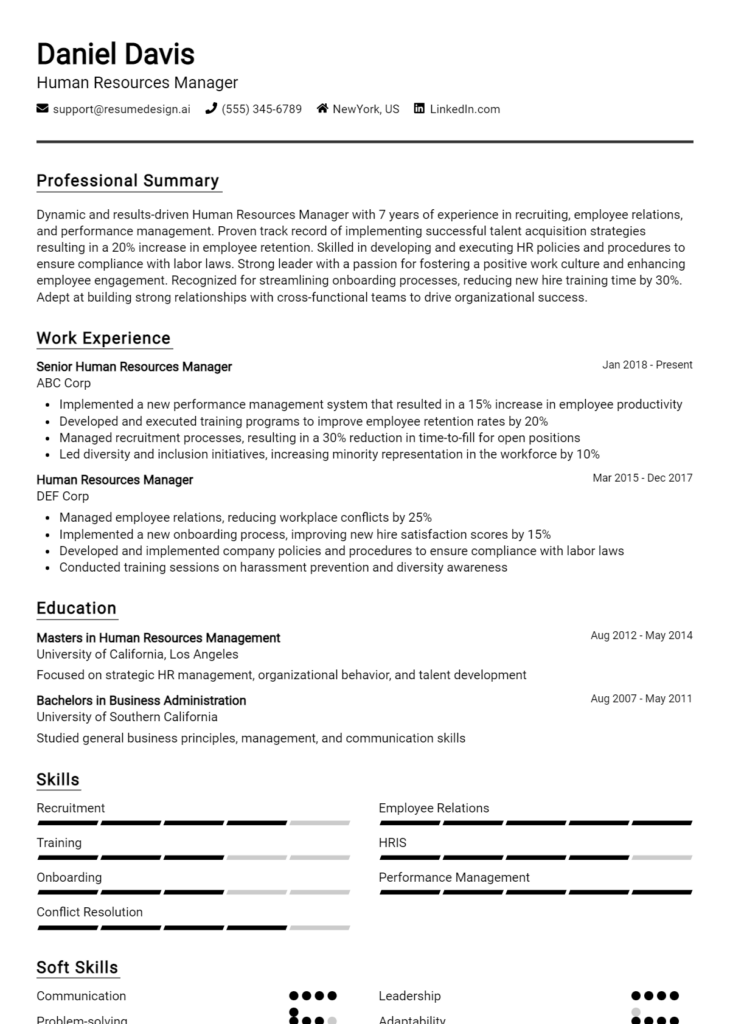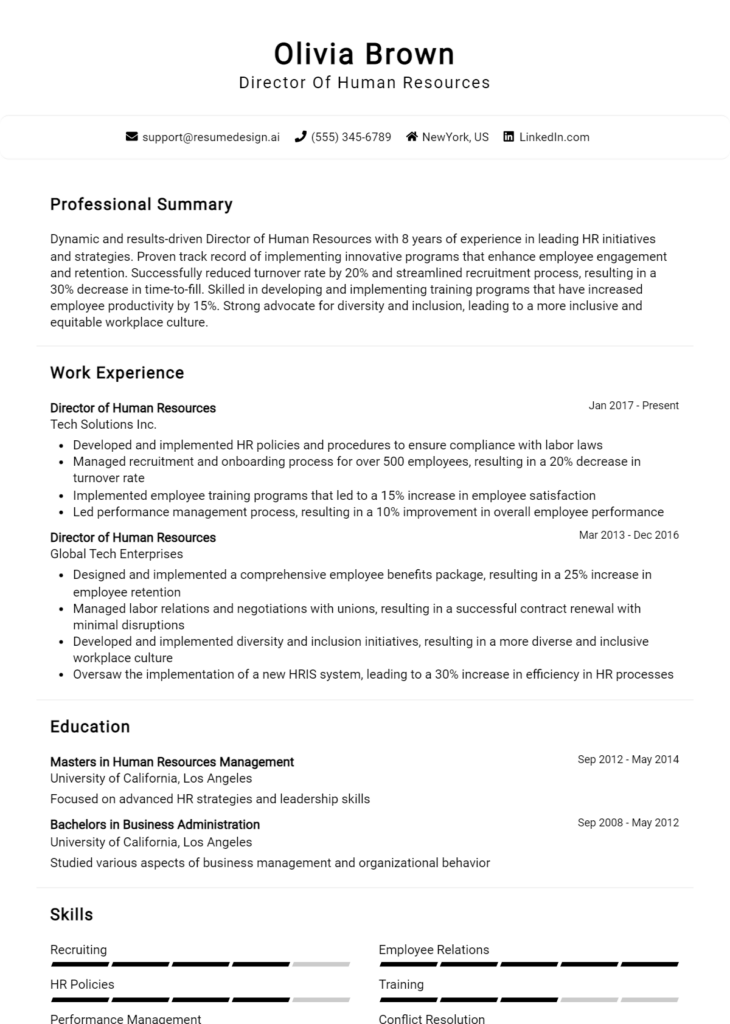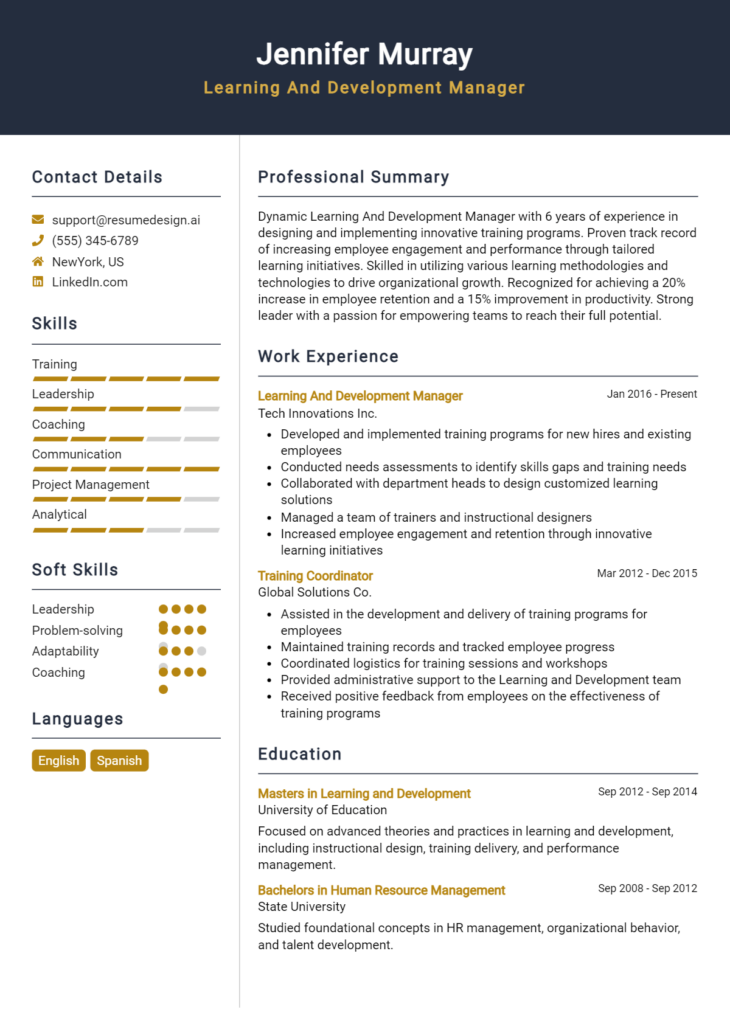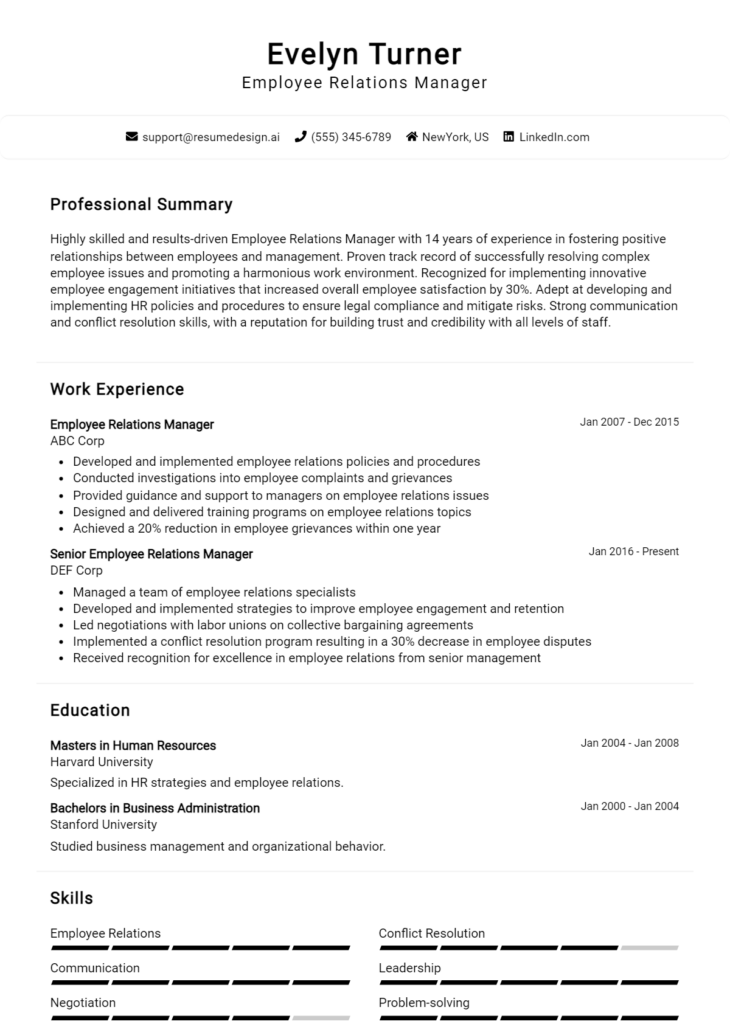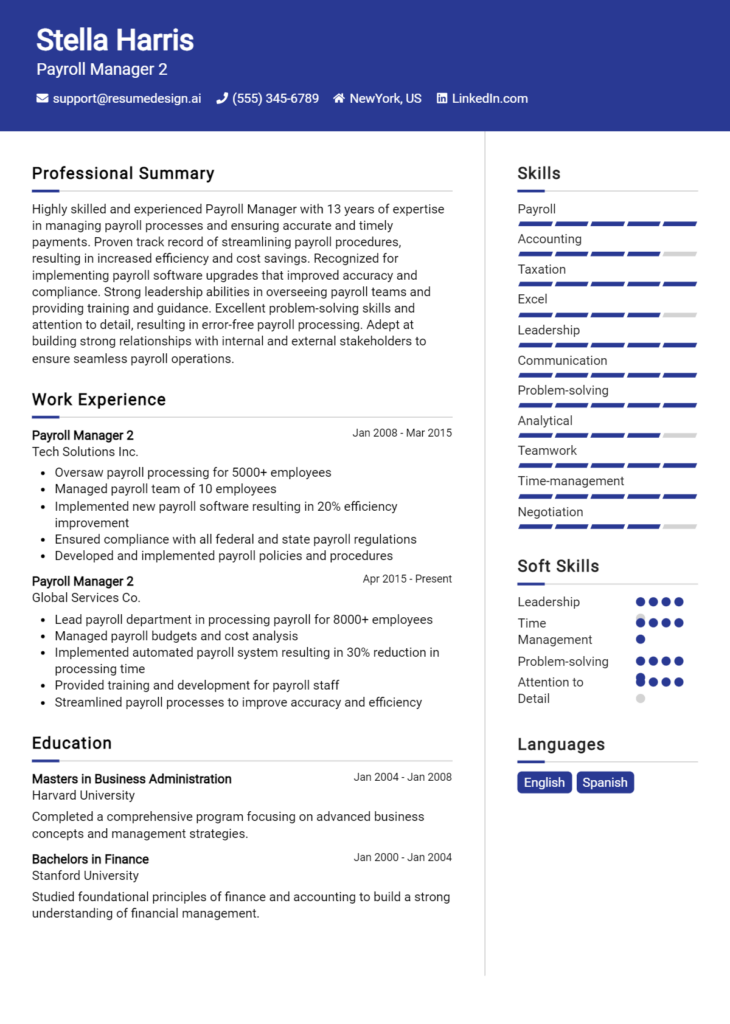Succession Planning Manager Core Responsibilities
A Succession Planning Manager plays a critical role in ensuring organizational continuity by identifying and developing internal talent for future leadership positions. This professional collaborates across departments to align succession strategies with business goals, requiring strong technical, operational, and problem-solving skills. Effective communication and analytical abilities are essential for assessing talent gaps and creating development plans. A well-structured resume can highlight these qualifications, showcasing the manager's impact on organizational success.
Common Responsibilities Listed on Succession Planning Manager Resume
- Develop and implement succession planning strategies aligned with organizational goals.
- Identify key leadership positions and assess potential internal candidates.
- Facilitate talent development programs and mentorship initiatives.
- Analyze workforce trends and create forecasts for leadership needs.
- Collaborate with HR and department leaders to assess talent readiness.
- Conduct regular reviews of succession plans and adjust as necessary.
- Design and deliver training programs to enhance employee skills.
- Monitor and report on the effectiveness of succession planning efforts.
- Engage in stakeholder communication to promote succession initiatives.
- Utilize data analytics to inform decision-making processes.
- Support diversity and inclusion initiatives within succession planning.
- Stay updated on industry trends and best practices in talent management.
High-Level Resume Tips for Succession Planning Manager Professionals
In the competitive arena of talent management, a well-crafted resume is crucial for Succession Planning Manager professionals. This document serves as the first impression a candidate makes on potential employers, making it essential to reflect not only relevant skills but also significant achievements in the field. A compelling resume can set you apart from the competition and demonstrate your ability to effectively navigate the complexities of succession planning. This guide will provide practical and actionable resume tips specifically tailored for Succession Planning Manager professionals, helping you create a standout application that highlights your expertise.
Top Resume Tips for Succession Planning Manager Professionals
- Tailor your resume to the specific job description by using keywords and phrases that align with the role.
- Highlight relevant experience in succession planning, talent management, and organizational development.
- Quantify achievements with metrics, such as the percentage of successful placements or reductions in turnover rates.
- Showcase industry-specific skills, including analytical thinking, strategic planning, and change management.
- Utilize a clean and professional format to ensure readability and easy navigation through your qualifications.
- Include certifications and professional development courses related to succession planning and leadership development.
- Demonstrate your ability to collaborate with cross-functional teams by providing examples of successful projects.
- Incorporate a summary statement that encapsulates your career goals and expertise in succession planning.
- Use action verbs to describe your responsibilities and achievements, making your contributions stand out.
- Proofread your resume thoroughly to eliminate any spelling or grammatical errors, as attention to detail is critical in this role.
By implementing these tips, you can significantly increase your chances of landing a job in the Succession Planning Manager field. A polished, tailored resume that effectively communicates your skills and accomplishments will resonate with hiring managers, making you a compelling candidate for the position.
Why Resume Headlines & Titles are Important for Succession Planning Manager
In the competitive landscape of human resources, particularly in the realm of succession planning, a well-crafted resume headline or title is crucial for a Succession Planning Manager. This brief yet powerful statement serves as a first impression and can significantly influence hiring managers' perceptions. A strong headline not only grabs attention but also succinctly summarizes a candidate's key qualifications in a single impactful phrase. It should be concise, relevant, and directly aligned with the job being applied for, setting the tone for the rest of the resume and highlighting the candidate's suitability for the role.
Best Practices for Crafting Resume Headlines for Succession Planning Manager
- Keep it concise: Limit your headline to one or two lines for clarity.
- Be specific: Use industry-relevant keywords that reflect the role of a Succession Planning Manager.
- Highlight key strengths: Focus on your most significant skills or achievements relevant to succession planning.
- Use action-oriented language: Start with strong action verbs that convey your proactive approach.
- Tailor for the job: Customize your headline for each application to reflect the specific requirements of the position.
- Avoid jargon: Use clear and straightforward language that can be easily understood by all hiring managers.
- Showcase results: If applicable, include metrics or outcomes that demonstrate your effectiveness in previous roles.
- Maintain professionalism: Ensure that your headline aligns with the professional standards of the industry.
Example Resume Headlines for Succession Planning Manager
Strong Resume Headlines
"Dynamic Succession Planning Manager with 10+ Years in Talent Development & Leadership Strategy"
“Results-Driven HR Leader Specializing in Succession Planning and Workforce Optimization”
“Transformational Succession Planning Expert with Proven Track Record of Enhancing Leadership Pipeline”
Weak Resume Headlines
"HR Professional"
"Experienced Manager"
The strong headlines are effective because they are descriptive, emphasizing specific skills and achievements that align with the Succession Planning Manager role. They use action-oriented language and provide a clear overview of the candidate's background and expertise. In contrast, the weak headlines fail to impress because they are vague and generic, lacking the specificity and impact needed to stand out in a competitive job market. By not conveying any relevant qualifications or unique strengths, they miss the opportunity to engage hiring managers and highlight the candidate's suitability for the position.
Writing an Exceptional Succession Planning Manager Resume Summary
A well-crafted resume summary is essential for a Succession Planning Manager as it serves as a powerful introduction that quickly captures the attention of hiring managers. In a competitive job market, a strong summary effectively highlights key skills, relevant experience, and notable accomplishments that align with the specific needs of the organization. By being concise and impactful, the summary sets the tone for the rest of the resume, encouraging hiring managers to delve deeper into the candidate's qualifications. Tailoring the summary to the job description ensures that it resonates with the reader, making it an indispensable tool in the job application process.
Best Practices for Writing a Succession Planning Manager Resume Summary
- Quantify your achievements by including specific numbers or percentages that demonstrate your impact.
- Focus on key skills relevant to succession planning, such as talent development, workforce planning, and strategic leadership.
- Tailor the summary to the job description, incorporating keywords and phrases that match the employer's needs.
- Keep it concise—aim for 3-5 sentences that encapsulate your strengths and career highlights.
- Highlight your experience in succession planning strategies and initiatives that have driven organizational success.
- Use action verbs to convey accomplishment and drive, making your contributions sound dynamic and impactful.
- Showcase your understanding of industry trends and best practices related to succession planning.
- Emphasize your interpersonal skills, as building relationships is crucial in talent management and succession planning.
Example Succession Planning Manager Resume Summaries
Strong Resume Summaries
Dynamic Succession Planning Manager with over 8 years of experience in developing and implementing talent management strategies, resulting in a 30% increase in internal promotions over the last two years. Proven ability to assess organizational needs and align talent pipelines with strategic business goals.
Results-driven professional with a track record of enhancing succession planning processes that led to a 25% reduction in leadership turnover. Skilled in coaching and mentoring high-potential employees, fostering a culture of growth and development within diverse teams.
Accomplished Succession Planning Manager with expertise in workforce analytics and strategic planning, successfully identifying and nurturing talent across the organization. Reduced time-to-fill key leadership positions by 40% through proactive succession initiatives.
Weak Resume Summaries
Experienced manager looking for a job in succession planning. Good at working with people and making plans.
I have several years of experience in human resources and am interested in succession planning roles. I am a team player and committed to helping organizations grow.
The examples of strong resume summaries are considered effective because they provide specific, quantifiable outcomes that demonstrate the candidate's impact in previous roles. They highlight relevant skills and experience aligned with the position of a Succession Planning Manager, making them compelling to hiring managers. In contrast, the weak resume summaries lack detail and specificity, failing to showcase tangible achievements or relevant expertise, making them less appealing and memorable in a competitive job market.
Work Experience Section for Succession Planning Manager Resume
The work experience section of a Succession Planning Manager resume is crucial as it provides potential employers with a concrete understanding of the candidate's professional journey, showcasing their technical skills, team management capabilities, and ability to deliver high-quality outcomes. This section not only outlines the specific roles and responsibilities undertaken but also highlights how effectively the candidate has contributed to organizational goals through quantifiable achievements. Aligning these experiences with industry standards is essential, as it demonstrates the candidate's relevance and readiness to tackle the challenges inherent in succession planning.
Best Practices for Succession Planning Manager Work Experience
- Highlight technical skills relevant to succession planning, such as talent assessment and workforce analytics.
- Quantify achievements by providing metrics, such as the percentage of internal promotions or the reduction in turnover rates.
- Emphasize team leadership by detailing experiences in managing cross-functional teams and coaching staff.
- Showcase collaborative projects with HR, executive leadership, and other departments to underline teamwork.
- Use action verbs to convey impact and ownership of projects and processes.
- Align past experiences with current industry trends and challenges in succession planning.
- Include relevant certifications or training that enhance your technical expertise.
- Tailor each work experience entry to the job description to highlight the most relevant accomplishments.
Example Work Experiences for Succession Planning Manager
Strong Experiences
- Developed and implemented a succession planning framework that increased internal promotions by 30% within two years.
- Led a cross-functional team of 10 in a talent assessment initiative, resulting in a 25% reduction in employee turnover.
- Facilitated workshops for 50+ managers on effective succession planning strategies, enhancing leadership pipeline readiness.
- Utilized workforce analytics to identify talent gaps, informing strategic hiring that improved team performance metrics by 15%.
Weak Experiences
- Assisted with succession planning tasks as needed.
- Worked on various projects related to employee development.
- Helped team members with their work occasionally.
- Participated in meetings about succession planning.
The examples classified as strong are impactful because they provide specific, quantifiable outcomes that demonstrate the candidate's strategic role in achieving organizational goals. They clearly outline the candidate's contributions and the results of their efforts. In contrast, the weak experiences lack specificity and measurable achievements, making them less compelling and memorable to potential employers. These vague statements do not effectively convey the candidate's skills or the significance of their roles within their previous organizations.
Education and Certifications Section for Succession Planning Manager Resume
The education and certifications section of a Succession Planning Manager resume plays a crucial role in showcasing a candidate's academic credentials and industry-relevant qualifications. This section not only highlights the candidate's formal education but also their commitment to professional development through relevant certifications and continuous learning. By providing detailed information about relevant coursework, specialized training, and recognized credentials, candidates can significantly enhance their credibility and demonstrate their alignment with the key competencies required for the role of Succession Planning Manager.
Best Practices for Succession Planning Manager Education and Certifications
- Prioritize relevant degrees in human resources, business administration, or organizational development.
- Include industry-recognized certifications such as SHRM-SCP, SPHR, or CIPD.
- Detail relevant coursework that pertains to talent management, leadership development, and organizational behavior.
- Highlight any specialized training in succession planning, coaching, or strategic workforce planning.
- Keep the information concise yet comprehensive, avoiding unnecessary details.
- Order the educational credentials chronologically, starting with the most recent.
- Consider including online courses or workshops from reputable organizations to show a commitment to continuous learning.
- Ensure that all listed credentials are current and relevant to the position.
Example Education and Certifications for Succession Planning Manager
Strong Examples
- M.A. in Human Resource Management, University of XYZ, 2021
- SHRM-SCP (Society for Human Resource Management - Senior Certified Professional), 2022
- Certificate in Succession Planning and Talent Management, ABC Institute, 2020
- Relevant Coursework: Strategic HR Management, Organizational Development, Leadership in Organizations
Weak Examples
- Bachelor's in Philosophy, University of ABC, 2005
- Basic First Aid Certification, Red Cross, 2019
- Certificate in Microsoft Office, Online Course, 2021
- High School Diploma, XYZ High School, 2000
The strong examples are considered effective because they directly relate to the core competencies required for a Succession Planning Manager, showcasing both relevant degrees and industry-recognized certifications. In contrast, the weak examples lack relevance to the role, featuring outdated or unrelated qualifications that do not enhance the candidate's profile for succession planning positions.
Top Skills & Keywords for Succession Planning Manager Resume
As a Succession Planning Manager, possessing the right skills is crucial for effectively identifying and developing future leaders in an organization. A strong resume highlighting both hard and soft skills sets the foundation for showcasing your capabilities to potential employers. Skills not only reflect your expertise but also demonstrate your ability to align with the strategic goals of the organization. By focusing on relevant skills, you can clearly communicate your value and readiness to manage the complexities of succession planning.
Top Hard & Soft Skills for Succession Planning Manager
Soft Skills
- Strategic Thinking
- Leadership Development
- Communication Skills
- Emotional Intelligence
- Relationship Building
- Problem-Solving
- Negotiation Skills
- Adaptability
- Conflict Resolution
- Team Collaboration
- Change Management
- Mentoring
- Active Listening
- Time Management
- Cultural Awareness
Hard Skills
- Talent Assessment
- Workforce Analytics
- Succession Planning Tools (e.g., SAP SuccessFactors, Oracle HCM)
- Project Management
- Data Analysis
- Performance Management Systems
- Organizational Development
- Training and Development Program Design
- Regulatory Compliance
- HR Metrics and Reporting
- Budget Management
- Risk Management
- Leadership Competency Frameworks
- Change Implementation Strategies
- Business Continuity Planning
- Knowledge of Employment Law
- Succession Planning Best Practices
For a deeper dive into how to effectively present your skills and work experience, check out the resources available to enhance your resume. Remember, emphasizing a balanced mix of these skills can significantly improve your chances of standing out in a competitive job market. For more insights on the essential skills required for this role, explore additional resources to ensure your resume is both comprehensive and targeted.
Stand Out with a Winning Succession Planning Manager Cover Letter
As a seasoned professional with extensive experience in human resources and talent management, I am excited to apply for the Succession Planning Manager position at [Company Name]. My background in developing strategic succession plans and fostering leadership talent aligns perfectly with your organization’s commitment to nurturing internal talent and ensuring continuity in key roles. I am eager to bring my expertise in identifying high-potential employees and creating tailored development programs that align with business objectives.
In my previous role at [Previous Company Name], I successfully led a comprehensive succession planning initiative that reduced leadership gaps by 30% over two years. By implementing a robust framework that included competency assessments, mentorship programs, and individualized development plans, I was able to enhance the readiness of our internal candidates for future leadership roles. My strong analytical skills allow me to assess talent effectively, ensuring that we not only meet immediate leadership needs but also build a strong pipeline for the future.
Collaboration is key in succession planning, and I pride myself on my ability to work closely with cross-functional teams to align talent management strategies with organizational goals. I have a proven track record of engaging stakeholders at all levels, from executives to front-line managers, to foster a culture of leadership development. I am passionate about creating environments where employees feel empowered to grow and contribute, ultimately driving organizational success.
I am excited about the opportunity to join [Company Name] and contribute to your vision of effective talent management and leadership development. I am confident that my skills and experience will allow me to make a significant impact in this role. Thank you for considering my application; I look forward to the possibility of discussing how I can support your succession planning efforts.
Common Mistakes to Avoid in a Succession Planning Manager Resume
Crafting a compelling resume for a Succession Planning Manager position is crucial, as it sets the tone for the hiring process. However, many candidates make common mistakes that can hinder their chances of landing an interview. Understanding these pitfalls can help you refine your resume and present yourself as a strong candidate. Here are some common mistakes to avoid:
Vague Job Descriptions: Failing to provide specific details about your previous roles can leave hiring managers unclear about your qualifications and contributions. Use quantifiable achievements and relevant responsibilities to demonstrate your impact.
Neglecting Key Skills: Omitting essential skills, such as talent assessment or strategic workforce planning, can make your resume less appealing. Tailor your skills section to reflect the competencies mentioned in the job description.
Overly Generic Resume: Submitting a one-size-fits-all resume can be detrimental. Customize your resume for each application to highlight the most relevant experiences and align with the specific requirements of the position.
Ignoring Professional Development: Failing to mention relevant certifications or ongoing education can give the impression that you are not committed to your professional growth. Include any relevant courses, certifications, or workshops that enhance your qualifications.
Poor Formatting: A cluttered or confusing layout can detract from the content of your resume. Use a clean, organized format with clear headings and bullet points to improve readability and ensure important information stands out.
Lack of Metrics: Not including metrics to quantify your achievements can weaken your claims. Use numbers to showcase the results of your initiatives, such as improved retention rates or successful leadership development programs.
Focusing Solely on Responsibilities: Listing duties without highlighting accomplishments can make your resume feel flat. Shift the focus to what you achieved in each role, demonstrating your ability to drive results.
Ignoring Soft Skills: Succession planning requires strong interpersonal skills, yet many resumes overlook this aspect. Highlight your abilities in communication, leadership, and collaboration to show your well-roundedness as a candidate.
Conclusion
In conclusion, the role of a Succession Planning Manager is crucial for ensuring organizational stability and growth. This position involves identifying and developing future leaders within the company, assessing talent, and implementing strategies that align with business goals. Key responsibilities include creating development plans, mentoring employees, and collaborating with HR to ensure a smooth transition during leadership changes.
As companies evolve, the importance of a solid succession plan cannot be overstated. It not only mitigates risks associated with turnover but also fosters a culture of growth and opportunity. To position yourself effectively for this role, it's essential to have a well-crafted resume that highlights your relevant experience and skills.
Now is the perfect time to review your Succession Planning Manager resume. Take advantage of the resources available to you, such as resume templates, which can help you create a visually appealing document. You can also utilize our resume builder for a user-friendly experience that allows you to customize your resume easily. Additionally, explore our resume examples for inspiration and to ensure your resume stands out. Don’t forget to check out our cover letter templates to complement your application and make a strong first impression.
Take the next step in your career by enhancing your resume and positioning yourself as a top candidate for the Succession Planning Manager role!

